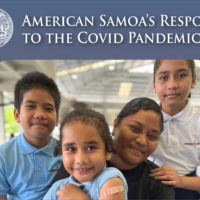
The Covid-19 Task Force Operations Report which was released Monday gives a breakdown of local and off island expenditures that went into repatriation and quarantine efforts since last year.
QUARANTINE FACILITIES:Off-island-$3,464,197.65/Local-$9,352,690.00= $12,816,887.65
FOOD/MEALS:Off-island-$1,601,076.72/Local-$2,007,551.00= $3,608,627.72
TRANSPORTATION: Off-island-$3,948,278.64/Local-$625,794.00= $4,574,072.64
DECONTAMINATION: Off-island-$75,608.23 /Local-$512,030.00 =$587,638.23
MEDICAL SERVICES: Off island-$362,590.57/Local-$365,810.00 =$728,400.57
The $12.8 Million utilized for quarantine facilities was for pre-travel and post-travel requirements in the state of Hawaii and in American Samoa.
A total of 1,830 travelers underwent quarantine in both Hawaii and American Samoa during the repatriation period.
Estimates from the Department of Health show that over 5,400 individuals (comprising ASG personnel, crew from pacific repatriation flights, and other special missions) were processed through quarantine in 2021.
In Hawaii, the quarantine sites included White Sands Hotel for the first flight and Waikiki Ohana East Hotel for subsequent repatriation flights.
In American Samoa, Tradewinds Hotel was the initial quarantine site and later expanded to include Fatu-o- Aiga Center, Sadies by the Sea, and the Department of Health’s Alternate Care Facilities.
“Many issues arose with the hotels mostly in damages and smoking charges to the hotels ultimately borne by the ASG. ASG may continue to pursue legal action to recoup these unplanned costs,” says the report.
$3.6 Million was spent on providing thousands of travelers in quarantine with 3 meals a day in both Hawaii and American Samoa. The number of days spent in quarantine varied with each phase and reached up to 24 days in the initial phases of repatriation.
Upon the phasing out of repatriation operations and the elimination of pre-travel quarantine in the latter half of the year, food services were reduced to post-travel quarantine only in American Samoa.
Food costs for public workers and key COVID-19 operation personnel and special meals for passengers with dietary accommodations were also included.
Local vendors who catered include Cecilia’s Restaurant, KS Mart, Sadies by the Sea, DDW, Night Hawk, Moana O Sina, A & E, and Paradise Pizza.
Hawaii vendors include Bistro on the Go, FCH Zippy’s, L & L, and Happy Bento to name a few.
$4.6 Million was utilized throughout the year on transportation costs supporting all repatriation and commercial flights. These costs included rental cars and shuttle services to transport wheelchair passengers from hotel to airport in Hawaii and passenger/luggage transport for charters in American Samoa. Vendors include Toilolo, Saumalu, Tofaga Malu, Skyview, Lupelele, Endtime Hope, Fetu Fou, Island Star Express, Pentagon, and Fuamatu.
$588,000 was spent on decontamination services provided by various vendors to ensure rooms were professionally sanitized at all quarantine sites and the decontamination of passenger luggage and vehicles with each flight for both Hawaii and American Samoa quarantine operations. Vendors include Anvee, Island Safety and Sanitation and Snow Services and BIO-X Hawaii LLC for decontamination services in Hawaii.
$728,000 was spent on providing medical disaster relief and dialysis services to passengers in both Hawaii and American Samoa beginning with repatriation charter #3 when stranded dialysis patients were able to return home.
The Medicaid State Agency received approval for its Disaster Relief State Plan Amendment (SPA) under the Public Health Emergency to support the repatriation efforts.
“This provided AS Medicaid coverage for pre-travel quarantine in Hawaii for medical referral patients and included never before done in-hotel dialysis services by US Renal Care to allow dialysis patients to return home,” says the Task Force report.
This dialysis coverage service was further extended to American Samoa through Hope Dialysis, outside of LBJ hospital, to ensure dialysis passengers could receive dialysis during quarantine in the territory.
Vendors include Hope Dialysis in American Samoa and US Renal Care dialysis in Hawaii.




